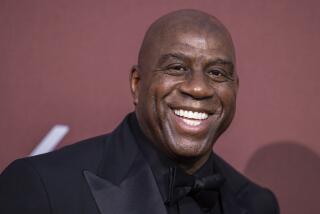Johnson’s Disclosure Stunned Sports World
- Share via
Perhaps no news story in recent decades carried with it the shock attendant to the Lakers’ Magic Johnson announcing he was retiring from basketball because he had contracted HIV, the virus that causes AIDS.
Was it possible? The 6-foot-9 dynamo from Michigan State, the big guy with the big smile that had illuminated NBA arenas for 12 seasons? The shock rocked the sports world.
In New York, Pat Riley was preparing to coach his Knicks against the Orlando Magic at Madison Square Garden.
He took the public address microphone and spoke to the crowd, asking everyone “in your own way to pray for Earvin and for the 1 million people who are afflicted with an insidious disease who need our understanding.”
Knick and Magic players gathered at midcourt and prayed.
Kareem Abdul-Jabbar, Johnson’s longtime Laker teammate, sounded a compassionate note.
“I know what AIDS victims go through and it isn’t a very pretty life . . . derision, bigotry and fear,” he said. “If he wants my help, I’ll be there.”
Announcer Chick Hearn said Johnson spent an hour before the Forum news conference meeting with teammates.
“All of a sudden, basketball becomes minuscule,” he said. “It’s nothing. All I can think about is this 19-year-old kid I met after he signed out of Michigan State. He never lost any of the charisma and charm he had that day.”
And this, from then-Los Angeles mayor Tom Bradley: “It was like someone hit me in the stomach with a 300-pound hammer. I can relate this only to one other incident in my memory and that was the news of John F. Kennedy being assassinated.”
Since that date, of course, Johnson has remained fit and highly visible with wide-ranging business dealings, a short-lived television talk show and basketball exhibitions in addition to his vice presidency and part ownership of the Lakers.
Also on this date: In 1965, in his jet-powered “Green Monster,” Art Arfons broke the world land speed record by reaching 576.533 mph at Utah’s Bonneville Salt Flats. . . . In 1978, former heavyweight boxing champion Gene Tunney died at 80. . . . In 1970, Mississippi quarterback Archie Manning ended his college football career by breaking his left arm in a game against Houston. . . . In 1988, Sugar Ray Leonard came off the canvas to stop Canadian light-heavyweight Donny Lalonde in the ninth round at Caesars Palace.
More to Read
All things Lakers, all the time.
Get all the Lakers news you need in Dan Woike's weekly newsletter.
You may occasionally receive promotional content from the Los Angeles Times.







